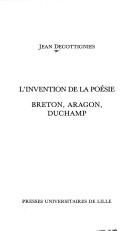| Listing 1 - 2 of 2 |
Sort by
|
Book
ISBN: 9783864423048 386442304X Year: 2020 Publisher: Köln Snoeck
Abstract | Keywords | Export | Availability | Bookmark
 Loading...
Loading...Choose an application
- Reference Manager
- EndNote
- RefWorks (Direct export to RefWorks)
This volume for the first time examines the women in and around Duchamp's life and work, focusing on contacts and convergences from Duchamp's youth up until his death in 1968. Some of the women gathered here were central figures in early twenty-century modernism, while others were part of fascinating intellectual and artistc networks that were, until now, in need of discovery. "Duchamp and the Women" introduces readers to the cultural circles and artistic movements in which the women presented were active and played a formative role. In addition to chronologically-grouped short biographies, comprehensive essays by Renate Wiehager and Katharina Neuburger—supplemented by a guest contribution from the literary scholar Sandro Zanetti—trace the paths of these protagonists as leading figures of early modernism and spokeswomen of a qualitatively new feminism. These essays deal with: Louise Arensberg (1879–1953), Gabrielle Buffet-Picabia (1881–1985) Katherine S. Dreier (1877–1952), Suzanne Duchamp (1889–1963), Elsa von Freytag-Loringhoven (1874–1927), Peggy Guggenheim (1898–1979), Mina Loy (1882–1966), Maria Martins (1894–1973), Mary Reynolds (1891–1950), Rrose Sélavy (“created” in 1920), Gertrude Stein (1874–1946), Carrie, Ettie, and Florine Stettheimer (1870–1944), and Beatrice Wood (1893–1998). Original texts by and about the women, some of which appear here for the first time in German and English, broaden the scope of the book by incorporating contemporary historical voices. A comprehensive bibliography also provides researchers from various fields with an important basis for further investigations into the lives and works of the people gathered in Duchamp and the Women—including Duchamp himself.
Women in art --- Women artists --- Women authors --- Art, Modern --- Intellectual life --- Biography --- History --- Duchamp, Marcel, --- Friends and associates. --- Art --- art [fine art] --- women [female humans] --- Arensberg, Louise --- Duchamp, Marcel --- Martins, Maria --- Reynolds, Mary --- Freytag-Loringhoven, von, Elsa --- Stein, Gertrude --- Stettheimer, Ettie --- Stettheimer, Carrie --- Guggenheim, Peggy --- Loy, Mina --- Wood, Beatrice --- Duchamp, Suzanne --- Dreier, Katherine Sophie --- Stettheimer, Florine --- Buffet-Picabia, Gabrielle --- kunst --- 7.071 DUCHAMP --- Duchamp Marcel --- conceptuele kunst --- dadaïsme --- futurisme --- kubisme --- concept art --- feminisme --- gender studies --- twintigste eeuw --- Sélavy, Rrose, --- Duchamp-Villon, Marcel, --- Villon, Marcel Duchamp-, --- Duchamp, Henri Robert Marcel, --- Dushan, Marsel, --- דושאן, מרסל --- デユシヤンマルセル, --- Duxiang, --- Sélavy, Rose, --- Friends and associates --- Relations with women --- Exhibitions --- Frau. --- Sélavy, Rrose --- Villon, Marcel Duchamp --- -Duchamp, Henri Robert Marcel --- Dushan, Marsel --- Duxiang --- Sélavy, Rose --- art [discipline]

ISBN: 2757426281 2859394575 Year: 2020 Publisher: Villeneuve d'Ascq : Presses universitaires du Septentrion,
Abstract | Keywords | Export | Availability | Bookmark
 Loading...
Loading...Choose an application
- Reference Manager
- EndNote
- RefWorks (Direct export to RefWorks)
Prenons pour une date symbolique ce 4 octobre 1926, où André Breton, optant pour ce qu’il appelle le « comportement lyrique » décida d’incorporer à la fiction de l’être féminin qu’il cultivait depuis son adolescence une passante de la rue Lafayette qui répondait au nom de Nadja. N’est-il pas vrai que, par cette décision, il inventait ou réinventait pour son propre compte la poésie, c’est-à dire la vie poétique, cette utopie qu’entretenaient aussi certains de ses amis, et qu’avait illustrée déjà Louis Aragon sous le nom du Paysan de Paris ? La poésie, la vie poétique, ne saurait se confondre avec le métier d’écrivain. Elle fait, en revanche, une place de choix à la métaphysique et, plus encore, à l’amour. On ne s’étonnera donc pas que la figure féminine soit constamment au centre des préoccupations du poète surréaliste. Une figure qui n’appartient pas davantage au réel qu’à l’imaginaire, et mérite, de ce fait, la qualification de magique-circonstancielle. Une figure qui, de surcroît, se dérobe autant qu’elle s’offre, objet d’une jouissance mélancolique et répondant à la condition de cette beauté érotique-voilée qu’on reconnaît aisément dans la Mariée de Marcel Duchamp. Ce qu’on appelle ici l’Invention de la Poésie ne revendique pas le statut d’un événement historique inscrit dans l’évolution de la littérature. Pas plus que la poésie ne veut être confondue avec ce genre littéraire que le mètre et la rime suffisent à distinguer de la prose. Il s’agit bien plutôt d’une activité mentale, associée à une pratique du langage, susceptible de réformer notre rapport au monde et à autrui, notamment dans l’amour, lequel, écrit symétriquement Breton, est « à réédifier ».
French poetry --- Love in literature. --- Surrealism (Literature) --- History and criticism. --- Breton, André, --- Aragon, --- Duchamp, Marcel, --- Criticism and interpretation. --- Sélavy, Rrose --- Duchamp-Villon, Marcel, --- Villon, Marcel Duchamp --- -Duchamp, Henri Robert Marcel --- Dushan, Marsel --- דושאן, מרסל --- デユシヤンマルセル, --- Duxiang --- Sélavy, Rose --- A-la-kung, --- Andrieux, Louis, --- Arāghūn, --- Aragon, Louis, --- Aragon --- Aragông, --- Aragông, Lui, --- Arankon, --- אראגאָן, לואי, --- אראגון --- Routisie, Albert de, --- Saint-Romain, Arnaud de, --- La Colère, François, --- Témoin des martyrs, --- Breton, André --- Бретон, Андре --- poésie --- critique --- genèse --- Painting --- Poetry --- Aragon, Louis --- Duchamp, Marcel --- Breton, André --- Love in literature --- Women in literature --- Poésie française --- Amour dans la littérature --- Surréalisme (Littérature) --- Femmes dans la littérature --- History and criticism --- Histoire et critique
| Listing 1 - 2 of 2 |
Sort by
|

 Search
Search Feedback
Feedback About
About Help
Help News
News